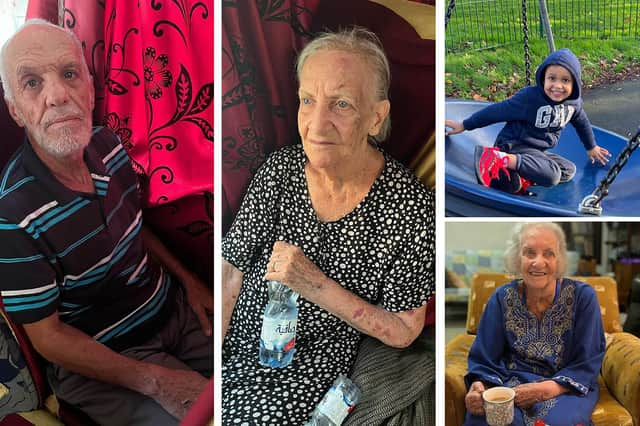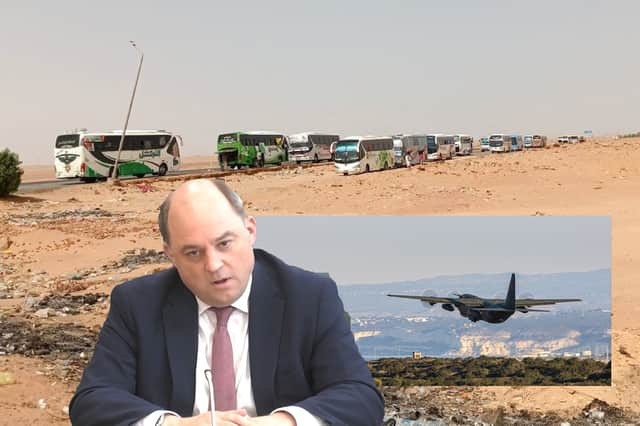Sudan war: families who fled conflict in capital fear no help from UK government for Britons outside Khartoum
and live on Freeview channel 276
Vulnerable Britons trapped in Sudan who took a chance on alternative ways out of the war-torn country say they are "distressed" and fearful those who fled the capital may not get any help from the UK government.
Clashes between Sudan’s army and a powerful paramilitary group known as the Rapid Support Forces broke out just over a week ago, with deadly shooting and shelling being seen in the capital, Khartoum. More than 400 people have died in the bloody conflict, with thousands of others injured.
Advertisement
Hide AdAdvertisement
Hide AdAs the internal violence continued to escalate, the UK’s armed forces launched a dangerous operation to evacuate British diplomats and their families from the African nation on Sunday (23 April). But the government faced questions over why as many as 4,000 other Britons living in the country had been left behind.
On Tuesday (25 April), the UK government finally starting evacuating these British nationals once a three-day ceasefire was declared, after facing intense criticism as for lagging behind other countries' rescue efforts. As of Wednesday afternoon, a total of four evacuation flights carrying 301 British nationals had departed from the military airfield, just out of Khartoum.
Sami Atabani, who lives in Cambridge, has been going backwards and forwards with the UK Foreign Office for days now - despite being on a trip to Toronto this week - trying to work out how best to help seven family members from Khartoum get to safety.


Families who fled for Egypt border 'distressed' and feeling the strain
Mr Atabani told NationalWorld his 88-year-old aunt Maureen, her 67-year-old son Farid - who is disabled - other son Fadi and wife Salma, and their three young sons, Khalil, Mahmoud, and Abdelrahman, had fled their home in the war-torn capital. All but his sister-in-law were British nationals.
Advertisement
Hide AdAdvertisement
Hide AdThe family chose to leave after not receiving any communication about evacuations on Tuesday. They were now one of many resorting to Plan B, he said, and were making the gruelling thousand-kilometre journey to the Egyptian border at Wadi Halfa by bus. “My cousin… is incredibly distressed, he’s worried as to whether he’s making the right decision.”
His aunt was becoming increasingly frail, he said, and both she and his disabled cousin were "showing the strain" of the long trip. Mr Atabani said he had been trying to arrange for an envoy to meet them at the border.
"The Foreign Office told me the only evacuation route is the airfield north of Khartoum, despite me telling them that it was impossible for the family to make there without risking their lives," he said. "I requested that they are met by consular officials at the border with Egypt but was told the government is only providing assistance from the airfield in Khartoum."
Wadi Halfa was now a "major disaster area", he said, as thousands of Sudanese citizens flocked to the border, trying to get to safety during the brief ceasefire. "So there is no accommodation available for my family to say until they cross to Egypt."
Advertisement
Hide AdAdvertisement
Hide AdMr Atabani continued: "I am angry and upset and haven’t slept since 4am trying to arrange for support for my family, whose [lives] has been turned upside down over night... I am heartbroken by this shambolic failure of the British government."


Maureen, who was born in Kent, had “spent most of her life in Sudan”, where she raised her four children. He said. “This is a family who had no intention of returning to the UK… These are people who did not want to leave, but were forced to leave.” He said the situation in Khartoum had started to become dire, with acquaintances killed in the conflict, and neighbours' homes looted. He encouraged his cousin to get the family out of there.
“[They were] running out of food… [I was] extremely worried, it’ll be very difficult for them to leave if things deteriorated,” he added.
Mr Atabani had registered them with the Foreign Office, but said despite government messaging that priority would be given to the most vulnerable - including families with children and the elderly - they were not contacted for evacuations on Tuesday. Many other foreign nationals had already been taken to safety by their governments, including some of his Canadian family members who had been picked up directly from their home.
Advertisement
Hide AdAdvertisement
Hide AdBritish nationals called for evacuation still had to make their own way at their own risk to the airfield out of Khartoum, he said. “I’m just flabbergasted. The Foreign Office doesn’t seem to understand the level of risk.”
Mr Atabani said the family felt “abandoned”. “It’s not acceptable, you can’t leave an 88-year-old woman like this,” he said. “We’re [also] talking about three young children under the age of 10, who have seen the country that they grew up in destroyed… These are going to be traumatised children.”
The family were also uncertain what they were running to even if they did make it to Egypt, and Mr Atabani slammed what he called a lack of clear communication from the UK government.
“We have no idea what kind of help and assistance they will receive when they get to the UK,” he said. They also did not know whether his cousin’s Sudanese wife would be allowed to come to the UK with her husband and children, or whether she would even be granted passage through Egypt.
Advertisement
Hide AdAdvertisement
Hide AdHe wanted the Foreign Office to issue clear guidance for British families fleeing the war-torn capital to either the Egyptian border or to Port Sudan, including where they could connect with the British military for evacuation to the UK.
He also wanted assurance these families - many of whom were leaving everything behind - would be taken care of. “I’d like to really appeal to the British government, to [make sure] people will have essentials when they arrive to the UK, including accommodation," he said. "They may or may not take you up, but at least that’s comfort that you are welcome back home.”


Government 'working on' other potential options to help Britons leave Sudan
A Foreign Office spokesperson told NationalWorld they had deployed RAF planes and government officials to establish an evacuation centre on the ground at the Wadi Saeedna airfield near Khartoum. "British nationals in Sudan should travel to this location as soon as possible to be processed for a flight."
"We will carry out flights for as long as possible, but the situation remains volatile and our ability to carry out evacuations could change at short notice." They added: "We are working on other potential options for helping British nationals leave Sudan, including from other points of exit. "
Advertisement
Hide AdAdvertisement
Hide AdDefence Secretary Ben Wallace told MPs on Tuesday (25 April) the 72-hour ceasefire represented a “window” for the evacuation, but “it is a volatile situation”.
Around 120 British military personnel were at the airfield near Khartoum being used for the evacuation effort, he said. “As of 11am this morning the processing centre, the reception team of Border Force and Foreign Office, were now up and running on the airfield in Sudan.”
The possibility of a seaborne evacuation from Port Sudan was also being considered, he said. “It is a more benign environment, it is an access into the Red Sea and to commercial airports in places like Jeddah [in Saudi Arabia] and gives us space and time in order to process many people there.”
Royal Marines were already in Port Sudan to “establish the safety of the area and any options”, Wallace said, so “we are in a good position there should we wish to increase support”.
Advertisement
Hide AdAdvertisement
Hide AdAsked about the evacuation efforts for British dual nationals in Sudan, he told the Defence Committee: “Communication is very patchy and very small. They are being called forward by the Foreign Office.”
Wallace added that “blanket conditions” were being produced to assist people in determining whether they should head to the airport because direct communication is proving so challenging.
When asked why escorts were not being provided for UK nationals trying to reach the air base on Wednesday, Home Secretary Suella Braveman said: “There’s an extensive programme of support that’s put on by the UK Government to support British nationals, British passport holders and their dependents in Sudan right now.
“The particular decisions, the precise details of what that operation include, are all very carefully reached on the basis of operational factors, sensitivity issues around the particular circumstances in Sudan.”
Advertisement
Hide AdAdvertisement
Hide AdBraverman also ruled out introducing safe routes for asylum seekers from Sudan to take refuge in the UK. “We have no plans to do that. Our focus first and foremost right now, and bearing in mind this is a fast-moving situation and a complex situation, is to support British nationals and their dependents.”
Comment Guidelines
National World encourages reader discussion on our stories. User feedback, insights and back-and-forth exchanges add a rich layer of context to reporting. Please review our Community Guidelines before commenting.